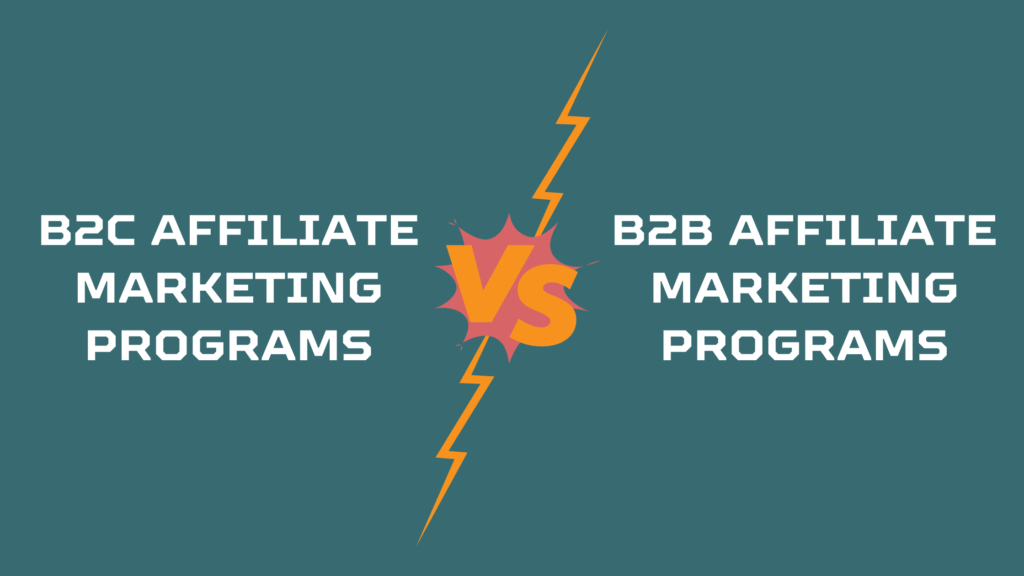
In today’s dynamic business landscape, companies constantly seek innovative ways to expand their reach, drive leads, and increase revenue. An example of a strategy that has garnered considerable attention is B2B affiliate marketing. This powerful approach offers cost-effective lead generation and opens doors to new markets and partnerships, making it a vital component of modern B2B marketing strategies.
This comprehensive guide delves into B2B affiliate marketing, exploring its definition, key players, strategies for success, real-world case studies, and future trends. Whether you’re a seasoned marketer looking to optimize your affiliate programs or a business owner curious about leveraging affiliates for growth, This blog post will provide valuable insights and practical steps to take action on strategies to harness the complete potential of B2B affiliate marketing.
Join us as we navigate through the intricacies of this dynamic marketing channel and uncover the secrets to driving B2B success through strategic affiliate partnerships.
So, let’s get started:
What Is B2B Affiliate Marketing?
B2B (Business-to-Business) Affiliate Marketing is a strategic partnership between businesses where one business (the merchant or vendor) leverages the marketing efforts of another company (the affiliate or publisher) to promote its products or services to a targeted B2B audience.
In this setup, the affiliate receives a commission or a referral fee for each lead, sale, or action generated through their marketing efforts.
Unlike traditional marketing channels, B2B affiliate marketing operates on a performance-based model. Affiliates receive compensation based on the outcomes they deliver. This incentivizes affiliates to focus on driving quality leads and conversions, making it a cost-effective and results-driven marketing strategy for businesses.
Importance Of B2B Affiliate Marketing
- Cost-effective Lead Generation: B2B affiliate marketing offers a cost-effective way to generate leads. Rather than making substantial investments in traditional advertising methods with uncertain ROI, businesses can leverage affiliates who are compensated based on performance, ensuring that marketing budgets are spent efficiently on actual results.
- Expanded Reach and Audience Targeting: Through collaboration with affiliates, businesses can leverage the affiliates’ established audience base, reaching new markets and demographics that may have needed more time to access through traditional marketing channels. Affiliates often have niche expertise and loyal followers, allowing businesses to effectively target specific audience segments.
- Leveraging Affiliate Expertise and Networks: Affiliates bring valuable expertise in online marketing strategies, content creation, and audience engagement. Businesses can leverage their skills and networks to generate focused traffic, enhance brand presence, and elevate sales by partnering with affiliates.
- Performance-based Results and ROI Measurement: This model ensures that marketing budgets are allocated efficiently, with clear metrics to track ROI and campaign effectiveness. Additionally, the performance-based nature incentivizes affiliates to drive quality leads and conversions, leading to mutually beneficial outcomes for both businesses and affiliates.
Having understood B2B affiliate marketing and its significance, let’s now explore the distinction between B2C and B2B affiliate marketing.
B2C Affiliate Marketing Programs Vs. B2B Affiliate Marketing Programs:

Target Audience:
- B2C (Business-to-Consumer) Affiliate Marketing Programs target individual consumers, focusing on products or services that cater to personal needs and preferences.
- B2B (Business-to-Business) Affiliate Marketing Programs target businesses and organizations, promoting products or services that address specific business challenges, such as software solutions, professional services, or industry-specific products.
Purchase Decision Complexity:
- B2C Affiliate Marketing often involves shorter and less complex purchase decision cycles, as individual consumers may make impulse purchases based on emotional or immediate needs.
- B2B Affiliate Marketing deals with longer and more intricate purchase decision processes as businesses evaluate multiple factors, including cost, ROI, scalability, and compatibility with existing systems.
Content and Marketing Strategies:
- B2C Affiliate Marketing relies heavily on engaging, visually appealing content, influencer endorsements, and promotions to capture consumer interest and drive conversions.
- B2B Affiliate Marketing focuses on educational content, industry insights, case studies, and data-driven marketing to showcase product/service value, address business pain points, and build trust with decision-makers.
Commission Structures and Partnership Models:
- B2C Affiliate Marketing often employs straightforward commission structures based on sales volume or leads generated, with affiliates targeting a broad consumer audience.
- B2B affiliate marketing may utilize more complex commission structures, such as revenue sharing or tiered commissions, reflecting longer sales cycles and higher-value transaction standards in business-to-business transactions. Affiliates in B2B programs often require industry expertise and specialized knowledge to promote and sell B2B solutions effectively.
Having understood the variance between B2C and B2B affiliate marketing, you might wonder if it fits your needs. Rest assured, we will address this question in the following section.
What Criteria Should You Consider To Determine If A B2B Affiliate Program Is Suitable For Your Business?
- Alignment with Target Audience and Goals: Evaluate if the affiliate program aligns with your target audience and business goals. Consider whether the affiliates in the program have access to the audience segments you want to reach and if their promotional strategies align with your marketing objectives. For example, if your goal is to expand into a new industry vertical, partnering with affiliates specialising in that industry can be beneficial.
- Product or Service Fit: Assess the compatibility of your products or services with the affiliate program. Ensure that the offerings you want to promote through affiliates are relevant to their audience and can provide value to potential customers. If your B2B solutions require specific expertise or industry knowledge, seek affiliates who can effectively communicate these benefits to their audience.
- Commission Structure and ROI Potential: Analyze the affiliate program’s commission structure and calculate the potential return on investment (ROI). Consider commission rates, payment terms, and performance metrics (e.g., leads, sales, conversions). Determine if the program offers competitive commissions that justify your marketing spend and if the expected ROI aligns with your business objectives.
- Affiliate Support and Resources: Evaluate the support and resources the affiliate program provides. Seek out programs offering training, marketing resources, and continuous assistance to aid your endeavours and affiliates in effectively promoting your products or services. Consider the program’s reputation for transparency, communication, and responsiveness, as these factors can impact the success of your affiliate partnerships.
Let’s now explore the strategies for running a successful B2B affiliate marketing campaign.
Strategies For Successful B2B Affiliate Marketing Campaigns

Targeted Affiliate Selection
- Begin by identifying affiliates whose audience aligns with your target market. Look for affiliates who cater to businesses or professionals in relevant industries or niches. This ensures that the affiliate’s audience is more inclined to show interest in your B2B products or services, enhancing the likelihood of successful conversions.
- Connect with affiliates with a proven track record of performance in similar campaigns or industries. Their expertise and experience can substantially affect the effectiveness of your affiliate marketing efforts.
- Collaborate with affiliates who understand the value proposition of your products or services. Provide detailed information, resources, and support to help them effectively promote your offerings to their audience.
Tailored Marketing Materials And Resources
- Develop customized marketing materials and resources tailored to each affiliate and their audience. This includes branded content, banners, landing pages, and promotional assets that resonate with the affiliate’s niche and align with your campaign objectives.
- Provide affiliates with access to product demos, case studies, whitepapers, and other educational resources that showcase the benefits and value of your B2B solutions. Empower them to communicate these benefits effectively to their audience, addressing common pain points and highlighting unique selling points.
- Offer ongoing support and training to help affiliates optimize their marketing strategies, leverage available resources, and maximize their promotional efforts. Regular communication and feedback loops ensure that affiliates stay informed and engaged throughout the campaign.
Data-Driven Performance Tracking
- Deploy advanced tracking and analytics tools to oversee the performance of your affiliate marketing campaigns, including monitoring crucial metrics like generated leads and conversions, sales attribution, and ROI to measure campaign effectiveness and identify areas for improvement.
- Use data insights to optimize affiliate performance, identify high-performing affiliates, and adjust commission structures or incentives based on performance metrics. Leverage A/B testing and experimentation to refine marketing strategies, messaging, and promotional tactics for better results.
- Establish clear KPIs (Key Performance Indicators) and benchmarks to evaluate the success of your B2B affiliate marketing campaigns. Regularly analyze performance data, generate reports, and share insights with affiliates to foster transparency, accountability, and collaboration.
Continuous Relationship Building
- Foster strong relationships with affiliates built on trust, transparency, and mutual success. Communicate openly, provide timely updates, and address any concerns or feedback from affiliates promptly.
- Recognize and reward top-performing affiliates with incentives, bonuses, or exclusive opportunities to encourage continued loyalty and engagement. Acknowledge their contributions to your campaign’s success and showcase successful collaborations as case studies or testimonials.
- Encourage collaboration and knowledge sharing among affiliates by facilitating networking opportunities, hosting webinars or workshops, and creating a supportive community. Engaged and motivated affiliates are more likely to invest time and effort in effectively promoting your B2B offerings.
Having discussed these strategies, let’s explore some challenges encountered in B2B affiliate marketing.
Challenges In B2B Affiliate Marketing

Regulatory Compliance And Legal Considerations
B2B affiliate marketing operates within a complex regulatory landscape, including data privacy laws, advertising standards, and industry-specific regulations. Businesses must ensure compliance with legal requirements such as GDPR (General Data Protection Regulation), FTC (Federal Trade Commission) guidelines, and industry standards to avoid legal issues and potential penalties.
This includes transparent disclosure of affiliate relationships, proper customer data handling, and adherence to advertising guidelines to maintain trust and credibility.
Managing Relationships And Communication With Affiliates
Effective relationship management is essential in B2B affiliate marketing, as it involves collaborating with multiple affiliates, each with unique needs, expectations, and communication styles.
Businesses must establish clear communication channels, provide timely updates and support, and foster open dialogue with affiliates to maintain positive relationships. Building trust, transparency, and mutual respect is crucial for long-term partnerships and successful campaign outcomes.
Dealing With Fraudulent Activities And Maintaining Trust
Fraudulent activities, such as click fraud, lead fraud, or unethical promotional practices, can pose significant challenges in B2B affiliate marketing. Businesses must implement robust fraud detection and prevention measures, closely monitor affiliate activities, and promptly investigate suspicious behaviour.
Maintaining trust and integrity in affiliate partnerships is paramount to preserving brand reputation, building customer confidence, and ensuring fair and ethical business practices.
FAQs
Q1. What is the difference between B2B and B2C affiliate marketing?
A. B2B (Business-to-Business) affiliate marketing focuses on promoting products or services tailored for businesses and organizations, targeting decision-makers and professionals. In contrast, B2C (Business-to-Consumer) affiliate marketing targets individual consumers, promoting products or services that cater to personal needs and preferences. The strategies, target audience, and purchase decision processes differ between B2B and B2C affiliate marketing programs.
Q2. How can businesses find suitable affiliates for their B2B affiliate marketing programs?
A. Businesses can find suitable affiliates for their B2B affiliate marketing programs by conducting thorough research and outreach. Identify affiliates whose audience matches your target market and industry niche. Utilize affiliate networks, industry forums, social media platforms, and professional networks to connect with potential affiliates. Evaluate affiliates based on their performance history, audience reach, content quality, and industry expertise to ensure a successful partnership.
Q3. What are some common challenges in B2B affiliate marketing, and how can businesses overcome them?
A. Common challenges in B2B affiliate marketing include regulatory compliance, managing affiliate relationships, dealing with fraudulent activities, and maintaining trust and transparency. Businesses can overcome these challenges by implementing clear affiliate agreements with compliance guidelines, fostering open communication and collaboration with affiliates, implementing robust fraud detection and prevention measures, and prioritizing transparency and integrity in affiliate partnerships. Regular monitoring, performance tracking, and continuous improvement efforts also contribute to overcoming challenges and ensuring the success of B2B affiliate marketing campaigns.
Conclusion
Given your deep understanding of B2B Affiliate marketing, why not harness the potential of strategic partnerships? Leveraging the power of partnerships is a strategic move for businesses seeking growth and success in the digital landscape. This partnership-oriented approach enhances brand visibility and credibility and allows firms to tap into new markets, access niche audiences, and leverage affiliate expertise for optimized marketing campaigns.
However, if you still have any questions about the blog, please feel free to leave them in the comments section below. We will be happy to answer them.
Thanks for reading 🙂








No Comments